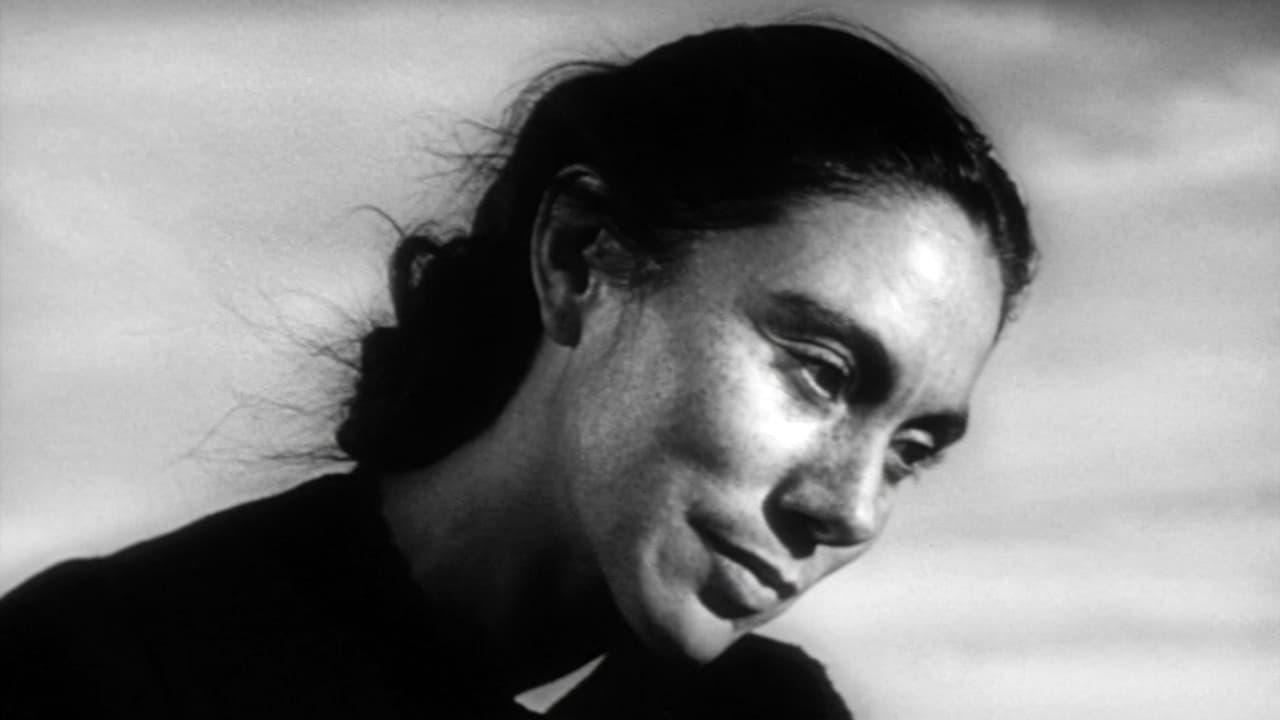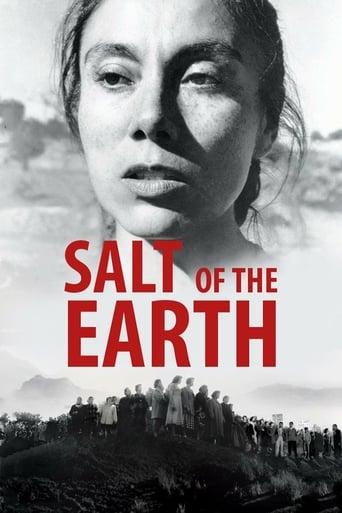Greenes
Please don't spend money on this.
Salubfoto
It's an amazing and heartbreaking story.
Marva-nova
Amazing worth wacthing. So good. Biased but well made with many good points.
Cassandra
Story: It's very simple but honestly that is fine.
david-sarkies
I gave this movie a high score not only because it is very anti-American, but it was made at a time where if you were anti-American you could be exiled, or even executed. 1953 was at the height of McCarthyism and the Hollywood Black List. Anything remotely smelling of communism was considered traitorous and a danger to the fulfillment of the American Dream.Suddenly appears Salt of the Earth, a movie where capitalism is attacked and the idea of liberty and truth is spat on. This movie challenges those who watch it to realise that America was not a land of equality and that even in the 1950's there were people living in poverty.The movie is based around a Zinc mine and a Latin-American community. The Mexican's men work in the mine while the women slave away in conditions which are way below the poverty level and the Anglo families who also work in the mine live a much higher lifestyle. There are problems at the mine as well for the Anglo's are treated with respect while the Mexicans are expendable, and as such they decide to strike. When the court orders the miners to cease striking, the women take up the job.When I look at this movie I see a movie that stands up and protests against the lies that enshrouded the Fifties. At this time women's rights were ignored and equality among the people was only something that the white people enjoyed. It wasn't until a few years later that the Negro equal rights movement began, but even then it was equal rights for Negros, and not Mexicans, Indians, or Asians. What this movie does is it attacks the American way of life and shows us that equality is a myth that will never be reached as long as equality remains only among the white people.When this movie was released in 1953 it caused a lot of anger among those who wanted to "protect the American way of life." It was shown in very few cinemas, and those that did were watched by the FBI and anybody who went inside were noted as potential seditioners. It is interesting to note that at that time there were more people searching for communists than there were communists. They say that the price of freedom is eternal vigilance, but I can't help thinking that their eternal vigilance is going in the wrong direction.
Emil Bakkum
There is nothing fancy about this film. It just tells a story that has to be told. The events are based on a true labor dispute, halfway the twentieth century, between American miners and the trust that controls their mine (among many others). It is docudrama, using realism, and consequently what you get is what you see. This seems a good choice, considering that there are already too much ambiguous films about trade unions (for example, On the Waterfront, or the various Hoffa interpretations). There is little action, and the film shots are sober, but the suffering of the people guarantees that you remain focused (if you have empathy). Interestingly a part of the characters play themselves. The miners feel that their wages are unfair and decide to strike (with support of their union). The situation is particularly tense, since the miners are of Latin-American origin, and are discriminated by the mining company. Naturally the miners form a picket line in order to stop scabs, and they succeed in this intention. The company decides to begin a war of attrition, and the miners have a hard time, in particular since the local sheriff takes side with the bosses. If we may believe the film story, the police officers are not too lazy to harass the strikers and lock them up. It seems as thought the strike is lost, when the court rules that the picket line is illegal. But then the wives of the miners step in, and take over the picketing. After many months the trust finally caves in. At last a strike with a happy ending!
james higgins
77/100. A very real and believably done movie, and it makes a powerful statement in a simple but persuasive way. What is amazing is how excellent the mostly non professional cast is, especially Rosaura Revueltas. She gives a beautiful and sensitive portrayal. Director Herbert J. Biberman does an excellent job developing the characters. Surprisingly the film has a feminist slant, one of the earliest examples of that in cinema. Making the film even more interesting is the group of men that participated in the film, producer Paul Jarrico, actor Will Geer, director Biberman and screenplay writer Michael Wilson were victims of the Blacklist. Very well done and a good of what you can do without much of a budget.
kellyadmirer
This propaganda film - and that is what it is, and that is not meant as a slight, it is what it is - takes an amazingly even-handed approach to the events surrounding a long strike in New Mexico during the 1950s. The politics remain relevant today for union workers and so forth, but for the larger audience, it also is a superb study in real human dynamics. There are mildly annoying aspects put in for dramatic effect - the strikers' wives are portrayed as a bit too noble and confrontational at times, the company men a bit too evil, the miners themselves as a bit too helpless and uncaring - but this still is one of the best studies of real human reactions to a difficult situation.It is inevitable that things break down into an us-versus-them battle, and that is the film's greatest weakness. Once the striking miners are prohibited by court order from picketing, the women all too willingly take their places. This causes all sorts of power shifts within families, portrayed well by the Quintero family played by Ramon Chacon and Rosaura Revueltas. So we get some healthy servings of "this is my life, see how you like it" from the women, causing the idle workers to re-examine their attitudes toward women and their jobs and their lives. Of course, there is the larger power imbalance between the striking workers and the mining company, summarized by Chacon's repeated observation that it is necessary to look at the "larger picture." The human dynamics spiral out of control to the point where it is unclear how Ramon Quintero really feels about developments, as he turns to drink and observes that the women "Won't listen to a man any more." But, of course, everything turns out fine in the end for the workers, as we all knew from the beginning it had to, after everyone has learned some hard lessons.The feminist subplot, though, is interesting but essentially a sideshow, put aside immediately once the strike is won and the workers get what they really want. The meat of the story is the confrontation between the poor locals and the authorities. That the outcome remains in doubt until the end of the film is a testament to the skill and craft of the makers of this film, including numerous non-professional actors. There are clear implications of mass power, with the sheriff's men repeatedly stymied by the sheer numbers of the workers and their families. If you want to read "Communism" into that, well, that's a perfectly reasonable implication, though certainly not the only one.The politics are clear, and there is no doubt about the motivations of those who made the film, but the message is kept as subtle as possible. There was no need to ban the film, that was sheer over-reaction. For what it is, you will probably not find a better examination of the human dynamics behind the struggle of workers for a better life.

